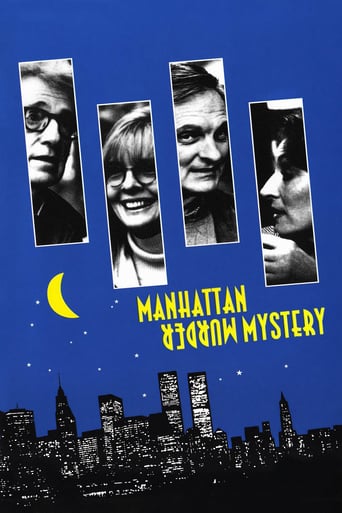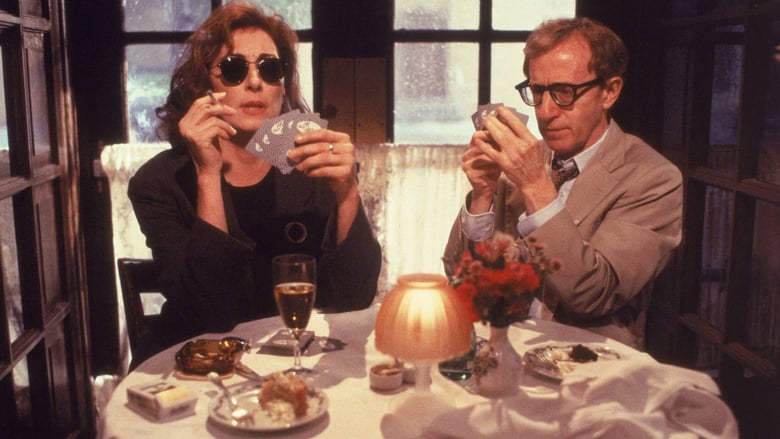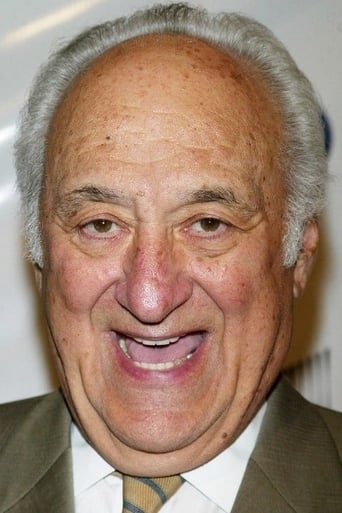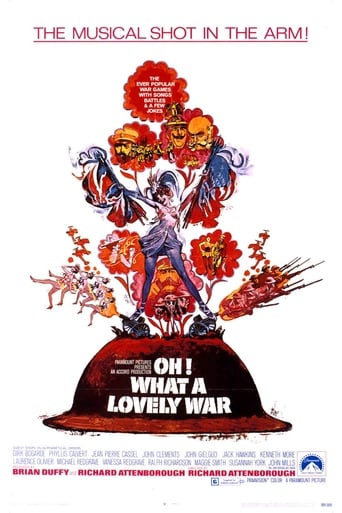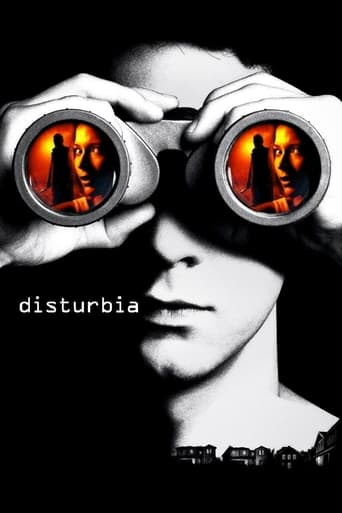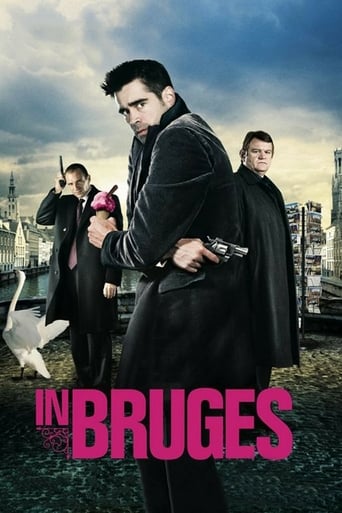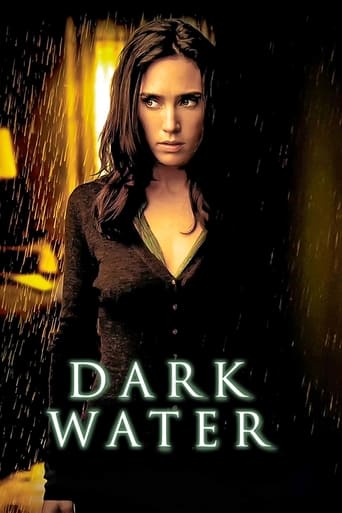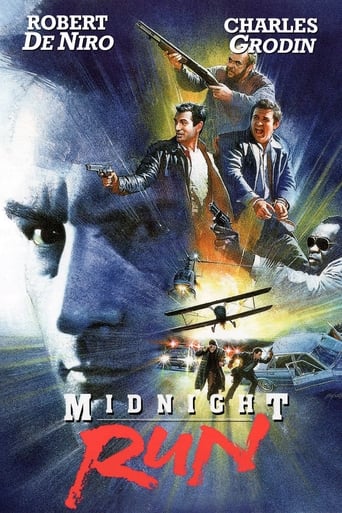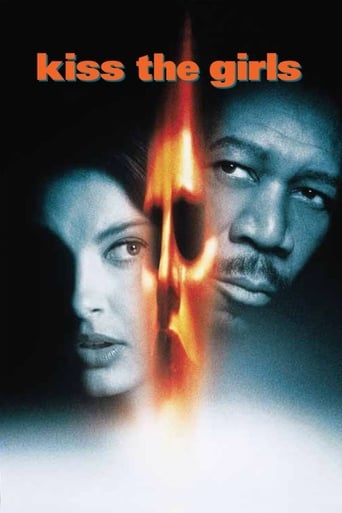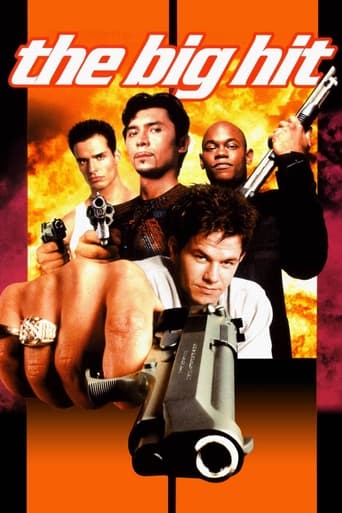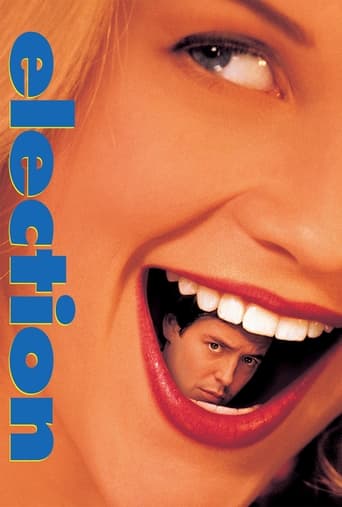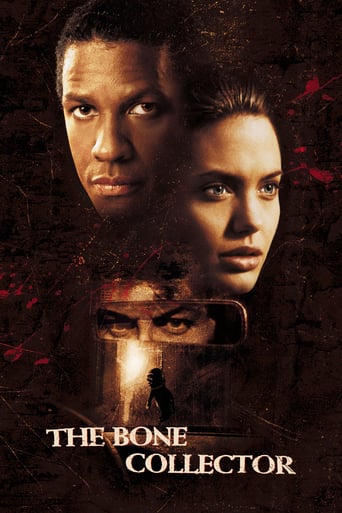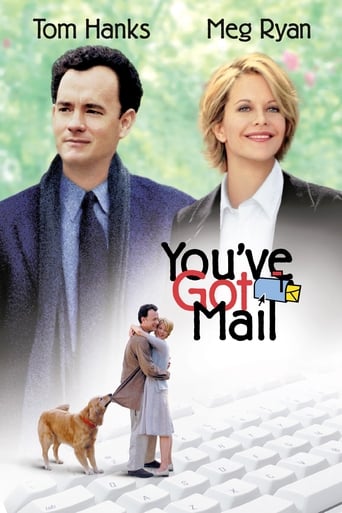Manhattan Murder Mystery (1993)
A middle-aged couple suspects foul play when their neighbor's wife suddenly drops dead.
Watch Trailer
Free Trial Channels
Cast


Similar titles
Reviews
Good start, but then it gets ruined
Not sure how, but this is easily one of the best movies all summer. Multiple levels of funny, never takes itself seriously, super colorful, and creative.
Great example of an old-fashioned, pure-at-heart escapist event movie that doesn't pretend to be anything that it's not and has boat loads of fun being its own ludicrous self.
The film never slows down or bores, plunging from one harrowing sequence to the next.
Especially in New York. Could they be involved in a coven of Satanists, a la "Rosemary's Baby", call girls a la " Kkute" or "Nuts"? How about simply just nosy pests who just never leave you alone? Married couple Woody Allen and Diane Keaton are your typical New Yorkers, taking in classic movie retrospectives, hockey games and even the opera. While home, Keaton and Alkwn briefly befriend the neighbors, and are shocked when all of a sudden, the wife dies if an apparent massive coronary. Suspicious Keaton begins to think that the husband knocked off the wife and begins to try to gather evidence to trap him. Typical lighthearted Allen script seems to have been rushed together in the wake of his personal scandals and comes off as forced. Woody has some funny comments on living in New York and the many types of eccentrics from all walks of life. Alan Alda is likable as the neighbor who first makes Keaton suspicious, while Angelica Huston plays an eccentric writer. Movies about Manhattan always utilize classic American songs and vintage location shots of the city as non- human characters. As these movies get older, the location footage just manages to get more nostalgic. Originally, Mia Farrow was to play the Keaton character, but for obvious reasons was replaced by Woody's former girlfriend and 70's co-star whom he hasn't worked with on screen in well over a decade, only using her briefly in "Radio Days". Enjoyable for what it us, this isn't one of Woody's best, being basically plot less and frequently annoying with a rather nervous energy that can be difficult to take.
"I don't know why you're not more fascinated by this! We could be living next to a murderer," Carol Lipton (Diane Keaton) emphasizes to her doubtful husband, Larry (Woody Allen). Larry isn't so convinced: "New York is a melting pot: I'm used to it!" When put in the situation of having a murderer live next door, there are two kinds of people: there are (1) the bored who decide their life could use a little fluffer, deciding to solve the mystery themselves, like a modern day Miss Marple, or (2) the fearful who figure it would be best to mind their own business and let karma stop by sometime in the future.Trouble is, Carol is of the first category, Larry of the second. She can't rest until she really knows what's going on; Larry, however, would rather go to work, come home for dinner at 5:00, stay up until the late hours of the evening to catch a forgotten classic on the classic movie channel, and continue the same routine for the rest of his life, spicing it up in safe ways when the occasion arises. But Carol has a mind of her own, and Larry, being played by Woody Allen (in which case meaning Allen is basically playing himself), is much too weak of a figure to stop her Nancy Drew madness.Who can blame her? Here's the situation: as the film opens, Larry and Carol bump into their aging neighbors, Mr. and Mrs. House (Jerry Adler and Lynn Cohen), who proceed to casually invite them up for coffee. The two are dull, but sweet: reaching old age, they have already purchased twin headstones, filling their days with blissful uneventfulness and hobbies like stamp collecting. Larry finds them pleasantly boring; the invitation was polite, sure, but neighbors are meant to be neighbors, not friends. Yet just as he's stating this sentiment to the kooky Carol, the unexpected happens with brute force. The following day, Mrs. House is announced dead. She had a heart condition.Larry is surprised but figures it to be another tragedy in the cruel game of life; Carol, on the other hand, is suspicious. Mrs. House never mentioned having a heart condition (strange considering she felt the need to discuss her hysterectomy only minutes into conversation). Mr. House must have murdered her. So she decides to do a little investigating herself, and, as it turns out, something is amiss. One point Carol, zero points Larry.These days, Woody Allen seems to travel back and forth between meaningful work and more passable fare. Critics flock to his old-age unevenness like a group of hungry vultures, but I've always enjoyed what he has to offer. When he's taking a break from changing the lives of his audience and having fun for a change, it's infectious (most of the time). "Manhattan Murder Mystery" is his finest, dare I say it, "lightweight" project. I could be biased, considering I watched the majority of his most famous films when I was too young to really understand their meaning, but over the years, "Manhattan Murder Mystery" has always stuck with me the most. Is it the contagiously humorous repartee between Allen and Keaton (in their first film together since 1979's "Manhattan"), the obvious homages to film noir(you can't beat "The Lady from Shanghai" playfulness of the ending) and Agatha Christie, the likable supporting performances from Alan Alda (the likable best friend type) and Anjelica Huston (the superiorly cool female figure), the New York setting? I can hardly decide, but Allen's deft combination of whodunit antics and absolutely hilarious exchanges makes every single thing about "Manhattan Murder Mystery" an unequivocal delight. And because he's realistic, of course he slides marital trouble and middle-aged discontent into the mix; it's the only way such an exciting story could exist in real life!With a luminous Keaton by his side, a truckload of his best lines ("Claustrophobia and a dead body - this is a neurotic's jackpot!"; "I can't listen to that much Wagner. I start to get the urge to conquer Poland."), and an unabashed sense of fun, "Manhattan Murder Mystery" is Allen at his best: confident, sensible, engaging, and uproarious.
Manhattan Murder Mystery basically comprises every characteristic of a bad Woody Allen movie. The plot is ultra basic, not to say simplistic and unfolds in a total linearity. A lot of scenes are just extremely talkative, drag on, and often give the impression they serve only one purpose which is Allen's annoying and unfunny mannerisms. The twists and turns are predictable, often completely ridiculous and have no effect on the viewer whatsoever. As for the plot, it fizzles out by a totally far-fetched justification. And what about the sloppy direction, these approximative shots and big zoom-ins worthy of the worst productions ? There is clearly nothing to save from this long, slow and boring Woody Allen's.
After 20 years of marriage, and with one son in college, Larry (Woody Allen) and Carol Lipton (Diane Keaton) try to accommodate with each other's interests, and from the very first hilarious exchanges, we get the point on how dramatically opposed they happen to be. To give you an idea, Larry loves watching ice hockey games while Carol prefers to listen to Wagner; she loves Manhattan's nightlife while he'd rather watch the midnight movie in bed. The differences between Carol and Larry get more obvious when they meet Mr. and Mrs. House (Jerry Adler and Lynn Cohen), an old couple living in the same floor. In a remarkably dialog-driven sequence, we feel Carol's enthusiasm to have an extra-time for socializing and Larry's impatience to live and stop enduring Mr. House's collection of stamps. At the end, we're not that surprised by the following discussion about the path their life is taking, their mutual attraction and all that marital existentialism. They have a dinner with friends in the following scene which feels like a reminiscence of "Manhattan", which is not surprising since the setting is one of the film's three titular 'M'. We learn that Carol wants to open a restaurant, Larry believes it's a foolish decision to take so late in life, yet one of their recently divorced friends Ted (Alan Alda) encourages her. We get it; Larry enjoys his life's pacific serenity while Carol desperately looks for a new meaning before it's too late. Many couples face that situation where the ambitions and goals in life suddenly differ, but Allen handles this material with a less polemical tone than the previous "Husbands and Wives" as if he was tired of hostile arguments. He leaves more room for Ted, whose adventurous temperament fits Carol's thirst for newness, not without feeling jealous about that. It's a pivotal, even crucial moment in Carol and Harry's marital life.Yet the title doesn't lie on the film's premise: it's a mysterious crime that will shatter their boring routine. Speaking of the mystery, if the previous scene where they meet the friendly Houses' couple reminded me of "Rosemary's Baby" when Mia Farrow and John Cassavetes met the Castevets, I was even more struck by the plot's similarities when after a night out, Carol and Larry discovers that Mrs. House died of a heart attack. Much more, Mr. House looked unusually cheerful and not too much distraught by the loss of the woman he spent 28 years and planned to be buried with in a twin-cemetery, raising Carol's suspicion. "She had a heart condition," he says, Carol insists that Mrs. House never mentioned that. At that point, we know what she's about, she smells something fishy and whether she's right or wrong matters less than that she finally found an opportunity to live some thrills. And the difference of attitudes between Carol and Larry is the film's comedic basis.Indeed, the conflict between Carol who wants to go further and Larry who wants her to stop, will originate one of Woody Allen's funniest lines: "Is that what you do when I'm forbidding? I'm not going to forbid you a lot, if you do". The greatest delight of "Manhattan Murder Mystery" relies on the way its intricate plot contributes to enrich the human relationships involved in the resolution and vice versa. Carol's amateurish investigation, her growing complicity with Ted, and Larry's clumsy attempts to help her after he understands that his marriage is in peril, are magnificently portrayed. And all these interactions culminate with the help of Marcia Fox, played by a scene-stealing Angelica Huston, a dark and sensual authoress and professional poker-player, so intuitive that she'll even steal Carol's thunder in the crime- solving process, and fascinate both Ted and Larry. As a counterpart to Carol's personality, like Ted for Larry, Marcia Fox will also teach Carol a few things about the word 'jealousy'. After, "Husbands and Wives", a powerful social commentary about marital relationships and an opportunity for Woody Allen to exorcise all the demons resulting from the custody battle with Mia Farrow, "Manhattan Murder Mystery" feels like a moment of pure refreshment. If it's not the best of Woody Allen's rich filmography, not nominated for a Best Original Screenplay or Best Supporting Acting Oscar (while it deserved some accolades) it's still extremely enjoyable and delivers what we'd expect from Woody Allen. And the main pillar of this enjoyment is definitely Diane Keaton's comeback and her incredible chemistry with Woody Allen. Indeed, I have much admiration to Mia Farrow, and she'll be forever associated with some of Allen's greatest achievements, but there has always been a sort of inner sweetness in Farrow that confined to poignancy and even sometimes to pathos, and this characteristic reaches a paroxysm in "Husbands and Wives" where not only her character, but the actress herself looked both unhappy, embodying the marital conflict that was poisoning their lives. Woody Allen said "Mia likes to do funny things, but she's not as broad a comedian as Diane is", although I don't approve the manner but I have to agree with the director, Mia Farrow is fine but as far as comedy is concerned, Diane Keaton has that little sparkle that makes all the difference. Yes, we have the New York middle-class lifestyle, the intellectual discussions with the couples of friends, Allen's neurotic personality ("a dead body and claustrophobia, a neurotic's jackpot"), his distaste for Wagner, a compositor who gives him the "urge to invade Poland" and the whole romantic twists and commentaries on men and women's relationships, all the ingredients for a great Allen's film are here but Diane Keaton is the icing on the cake.And believe me, she's for more than three quarters in what make "Manhattan Murder Mystery" such a delicious pastry, reminding us how a great chemistry she always had with Woody Allen, hell, even when they argue, they're hilarious.

